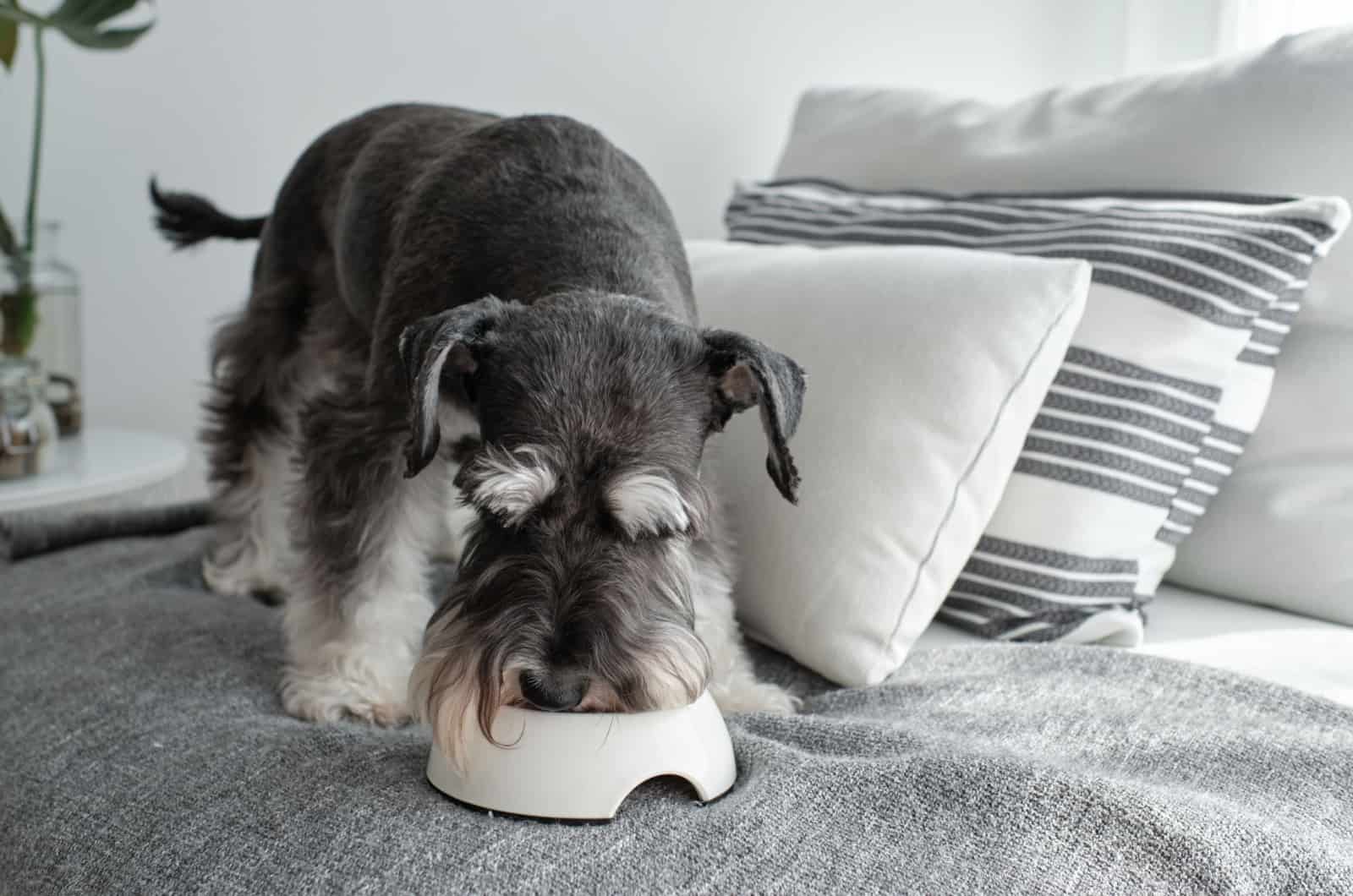Miniature Schnauzers — little Terrier dogs that are incredibly popular for a good reason. These spunky little fellas are great companion dogs and even better playmates for children. They are active, outgoing, and sometimes a bit stubborn, but we love them unconditionally.
Because of our love for this dog breed, we decided to help out aspiring and new owners with a Miniature Schnauzer feeding chart. Yep, today we are talking all about feeding your new Mini Schnauzer puppy.
Miniature Schnauzers are high-energy dogs and I believe that all of us who own one are aware of this fact. However, many new owners make feeding mistakes so they either overfeed or underfeed their new Mini Schnauzer pup.
All the do’s and don’ts of feeding your new fluffy friend can be found in this Miniature Schnauzer feeding chart. Let’s begin now, shall we?
Miniature Schnauzer Feeding Chart Preview
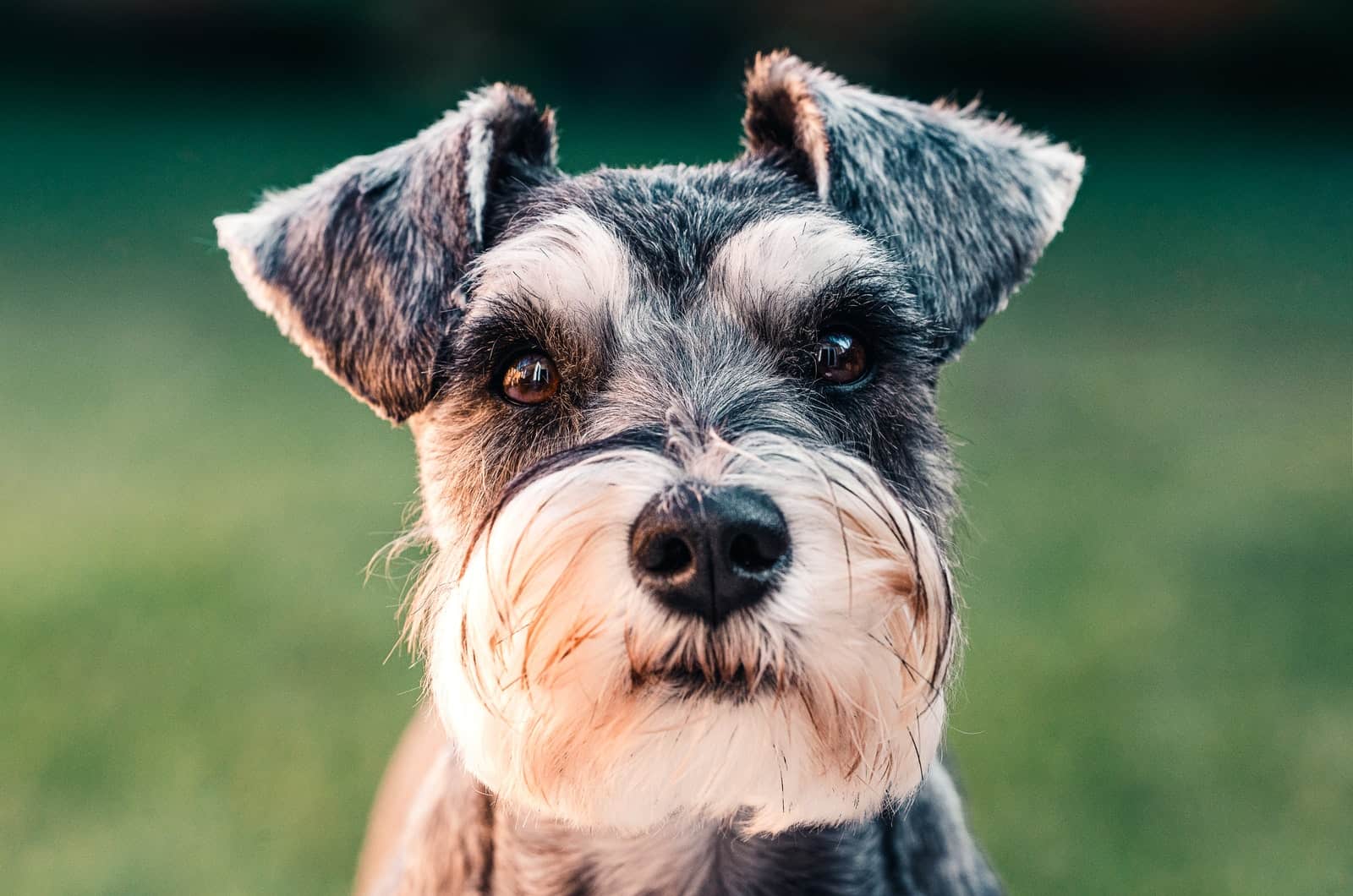
We want to keep things sweet and simple, just like the Miniature Schnauzer puppy is. That is why we are showing you a sweet and simple preview of the Miniature Schnauzer feeding chart.
Here you will find information on how much a Mini Schnauzer should be fed according to its weight and size.
[table id=676 /]
This is the simplest Miniature Schnauzer feeding chart, right? Well, if you thought that this is it, hold up because we are done here! Feeding a Mini Schnauzer is much more complex and requires thorough planning.
Grab yourself a snack, and your Miniature Schnauzer a treat because we have started with our Mini Schnauzer feeding guide!
Miniature Schnauzer Puppy Feeding Chart
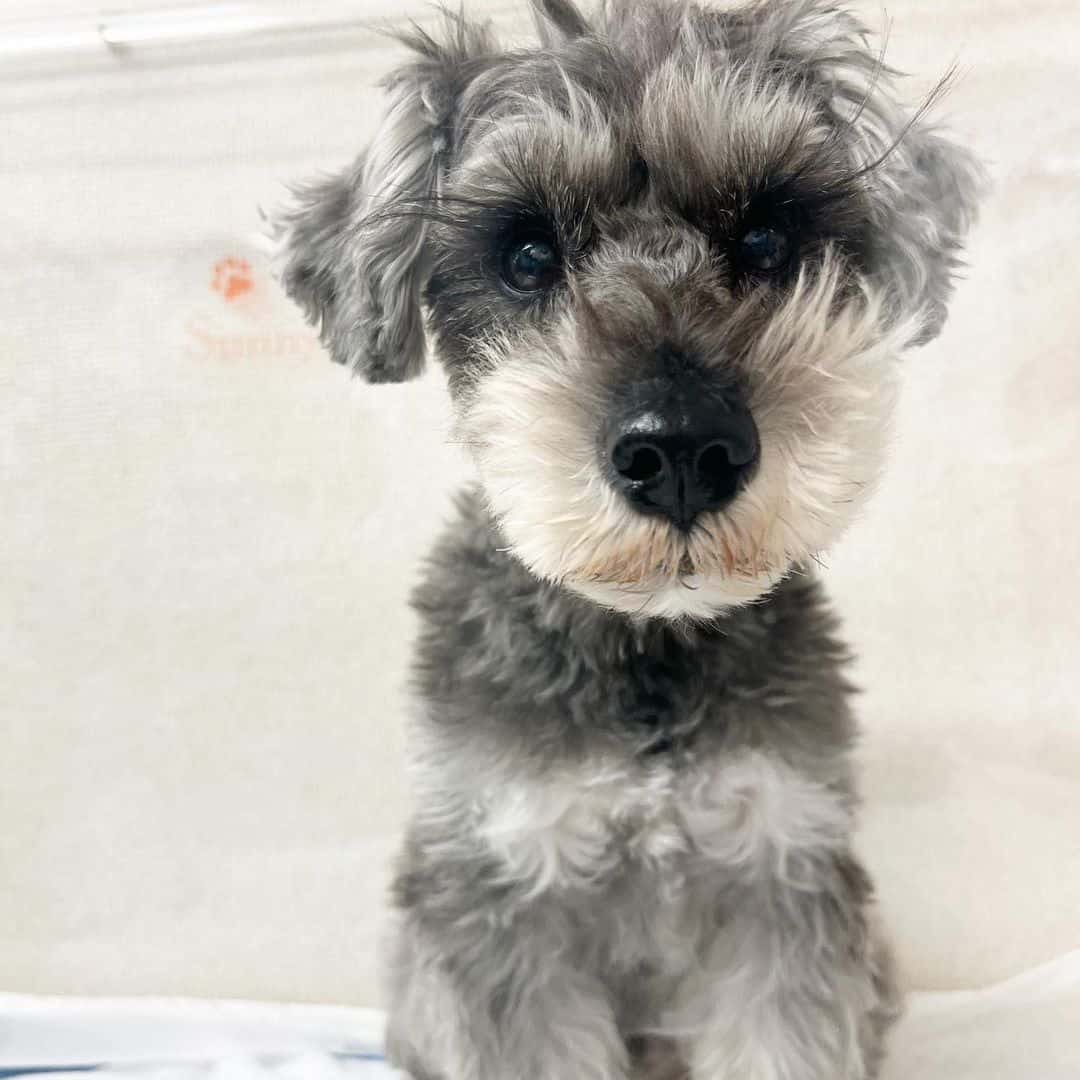
Miniature Schnauzers are already small dogs, but compared to them, mini Schnauzer puppies are teeny tiny. So, imagine how much their diet is different from that of adult dogs.
Miniature Schnauzer puppies are like all puppies — they nurse, grow their little teeth, stop nursing, transition to puppy food, and then to adult dog food. Sounds simple enough, right?
[table id=677 /]
While it is relatively simple, new Miniature Schnauzer puppy owners must take extra precautions in helping their pups safely transition to new food.
There are so many things to take into consideration when it comes to feeding Miniature Schnauzers: from the size of this pooch, from food intolerance, dietary indiscretion, sensitive stomachs, to food allergies.
Miniature Schnauzer Feeding Chart: Feeding Schedule
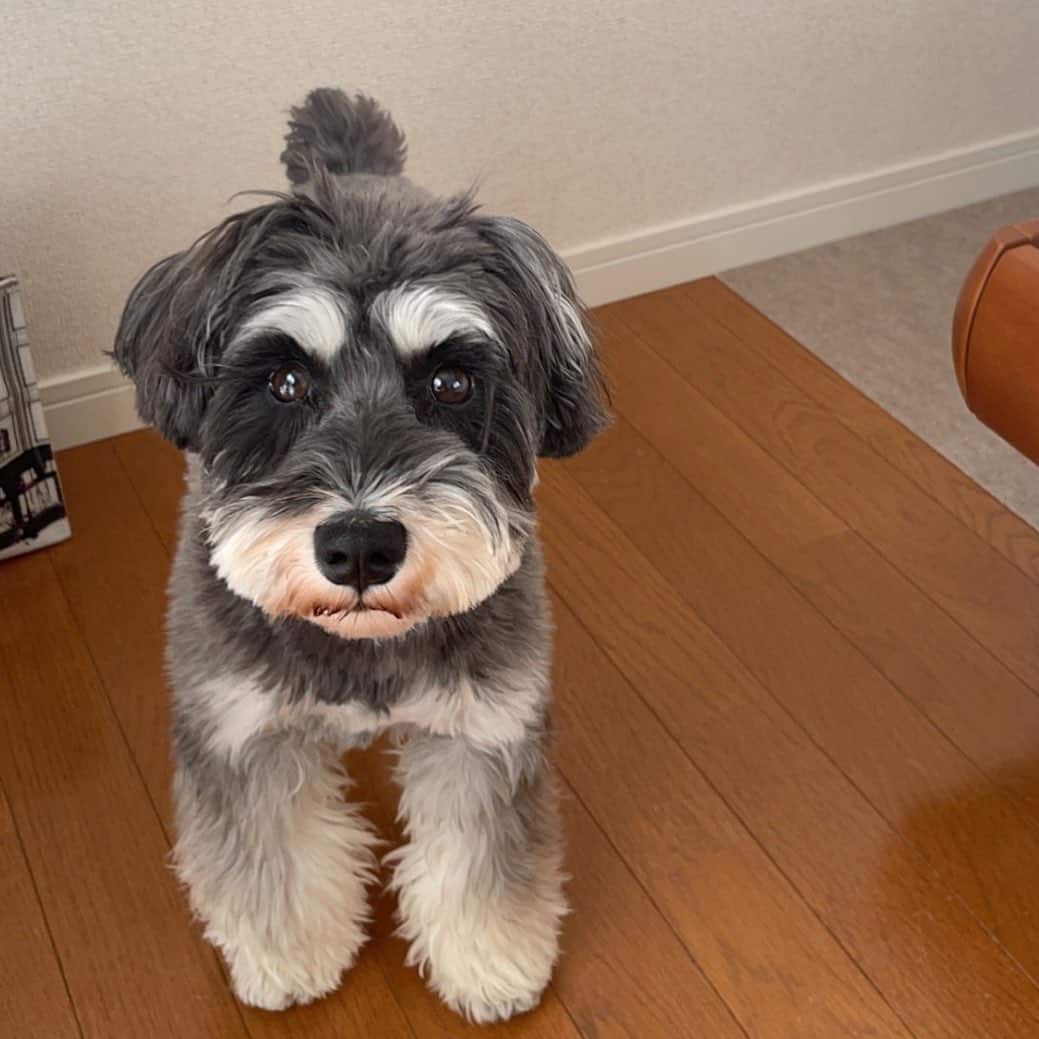
It is not all about how much you feed your Miniature Schnauzers, it is also about how frequent you feed it. And yes, there is such a thing as feeding your Miniature Schnauzer too much.
As a rule of thumb, Miniature Schnauzers and all other Terrier dog breeds should be fed a smaller amount of food a few times per day. That way they don’t have to eat a large meal at once.
Eating a lot of food all at once can make any dog’s tummy upset, especially a Miniature Schnauzer’s tummy. This is something that many Miniature Schnauzer owners struggle with because these dogs like to eat a lot, it is simply in their doggie nature.
[table id=678 /]
Please be reminded that these numbers are solely estimates of how much a Miniature Schnauzer dog eats. There can be several different factors that can affect the feeding schedule of your puppy, adult, or senior Miniature Schnauzer.
So, a friendly recommendation is to consult your favorite vet and ask them to let you know how much and how often you should feed your Miniature Schnauzer dog.
How Much And How Many Times Should I Feed My Miniature Schnauzer?
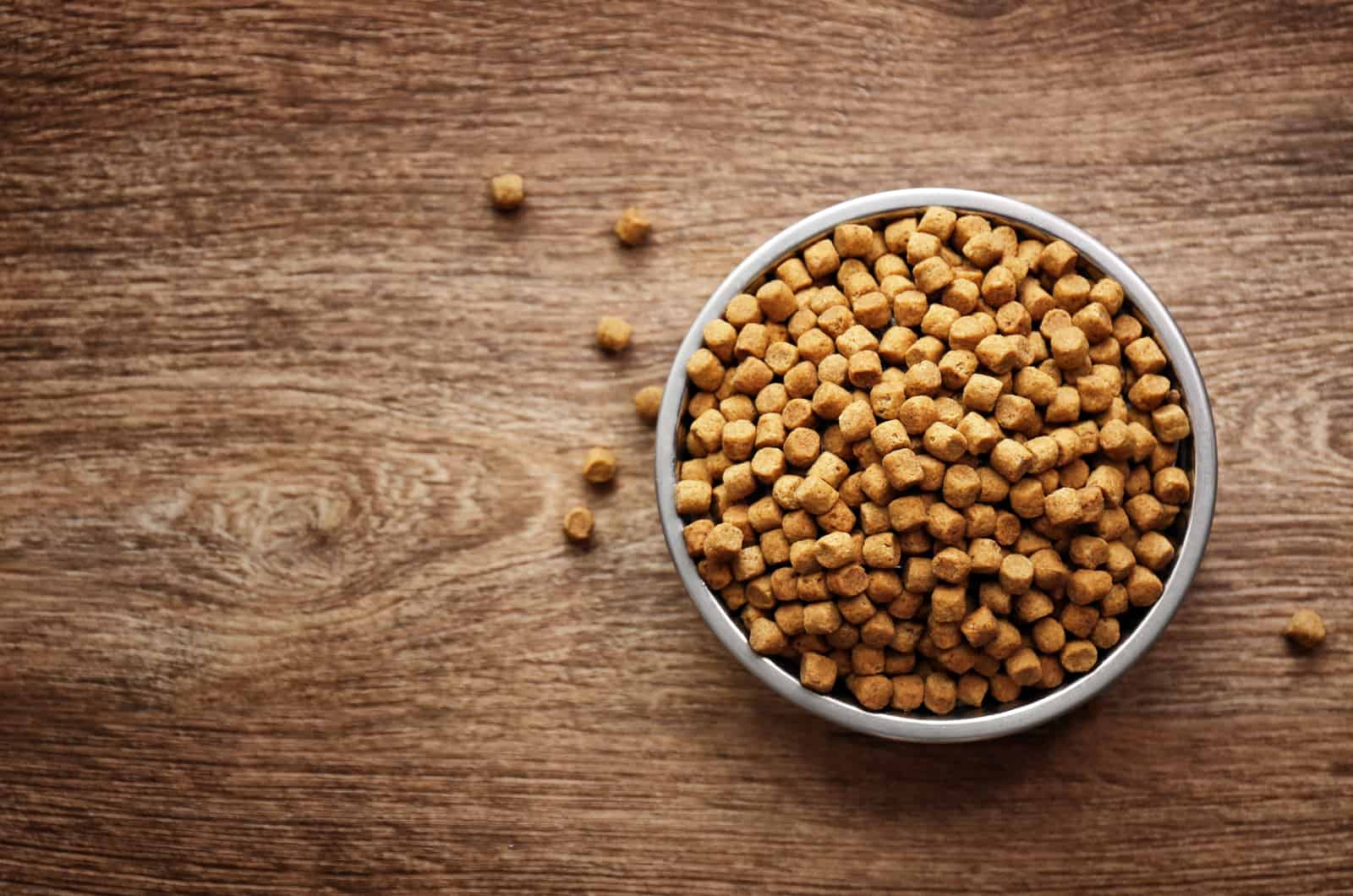
Now that we have all our charts in one place, let’s give some detailed information about the different feeding amounts in Miniature Schnauzer puppies, adults, and senior dogs.
There is a reason why Miniature Schnauzer puppies should not eat adult dog food and why adult/senior Mini Schnauzers should not eat puppy food.
Feeding guidelines are different for different Schnauzer dogs. For example, a Teacup Miniature Schnauzer can not be fed the same as a miniature, standard, or giant Schnauzer because its body and stomach are so small.
If you are wondering how much a Miniature Schnauzer eats depending on the life stage, stick around to find out!
Miniature Schnauzer Puppies
Miniature Schnauzers are probably dogs with the biggest activity levels — they have so much energy that owners can not keep them in one place! There are probably no lethargic and laid-back Miniature Schnauzer puppies that I know of because all of them are extremely outgoing and high-energy dogs!
Oh and trust me, Miniature Schnauzer puppies will not get easier until their little stomachs are full!
With so much energy to spare, Miniature Schnauzer puppies need some high-quality food to use as fuel. Therefore, Miniature Schnauzer puppies should be fed more frequently throughout the day.
Four to five meals a day will be just enough for a Mini Schnauzer that receives a daily dose of physical activity and playtime. However, the feeding amount and feeding frequency will depend on each puppy because some Miniature Schnauzer puppies have bigger appetites than others.
Miniature Schnauzer Adults
Even adult Miniature Schnauzer dogs occasionally get zoomies like puppies, but their metabolisms are very different from those in pups.
Having said that, adult Miniature Schnauzers should be fed the appropriate amount of low-fat and good-quality food that is rich in protein, and fatty acids such as fish oil. However, Mini Schnauzer adults should not be fed throughout the day as often as their younger counterparts.
A rule of thumb is to feed an adult Miniature Schnauzer twice a day — in the morning and in the evening. Again, depending on the activity level of the adult Mini Schnauzer. If it is a very active dog, then you might want to feed it up to three times per day.
As a loving Mini Schnauzer owner, you should reward your adult dog with a few treats in between two meals. Be cautious though because giving your Mini Schnauzer one too many treats daily can be very bad for its overall health.
Also, you don’t want to get your adult Mini Schnauzer too used to treats because it won’t eat its regular dog food.
Lactating Female Miniature Schnauzers
When it comes to female dogs that are lactating, their dietary needs are very special. Lactating female Miniature Schnauzers need a lot of high-quality food to support their bodies and aid in puppy development.
Nutritious dog food is a must for every pregnant pooch, especially a pregnant Miniature Schnauzer. Her puppies feed off of nutrients that she eats, which is how they grow bigger and stronger.
Moreover, Miniature Schnauzer puppies must receive healthy nutrients so that once they are born, their immune system develops normally.
Unfortunately, a lot of kennel-kept Miniature Schnauzer females are very tired and unhealthy due to unethical breeding practices, plus they do not receive high-quality dog food to support the normal development of their puppies.
This is why the Miniature Schnauzer puppies that are born in kennels usually exhibit developmental health issues.
Miniature Schnauzer Seniors
Oh, senior Miniature Schnauzers are among the cutest. They grow gray hairs on their snouts and eyebrows and have those puppy eyes that no one can resist. But, dog owners must be strong enough to resist the urge to feed senior Miniature Schnauzers too many treats and too much dog food.
You see, a senior Miniature Schnauzer’s immune system is not as robust as it once was. Normally, senior dogs are less healthy than adults and puppies which is why they require special feeding guidelines. That being said, a senior Miniature Schnauzer should be fed twelve hours apart; morning and evening.
Senior Miniature Schnauzers require a varied and nutritious diet that frequently includes supplements. Additionally, free-feeding Miniature Schnauzers when they reach old age is not a good idea. This is because their metabolism is slower than that of adult Miniature Schnauzers, and too much food can cause tummy aches and digestive problems.
Especially if a senior Miniature Schnauzer is suffering from a chronic health problem, be it kidney disease or heart disease. This is why for example, special homemade diets designed for dogs with kidney disease work great to support a senior Miniature Schnauzer’s immune system.
There are several non-prescription dog foods for urinary health that can aid both adult and senior Miniature Schnauzers that have problems with UTIs and bladder stones.
What Is The Best Food To Feed A Miniature Schnauzer?
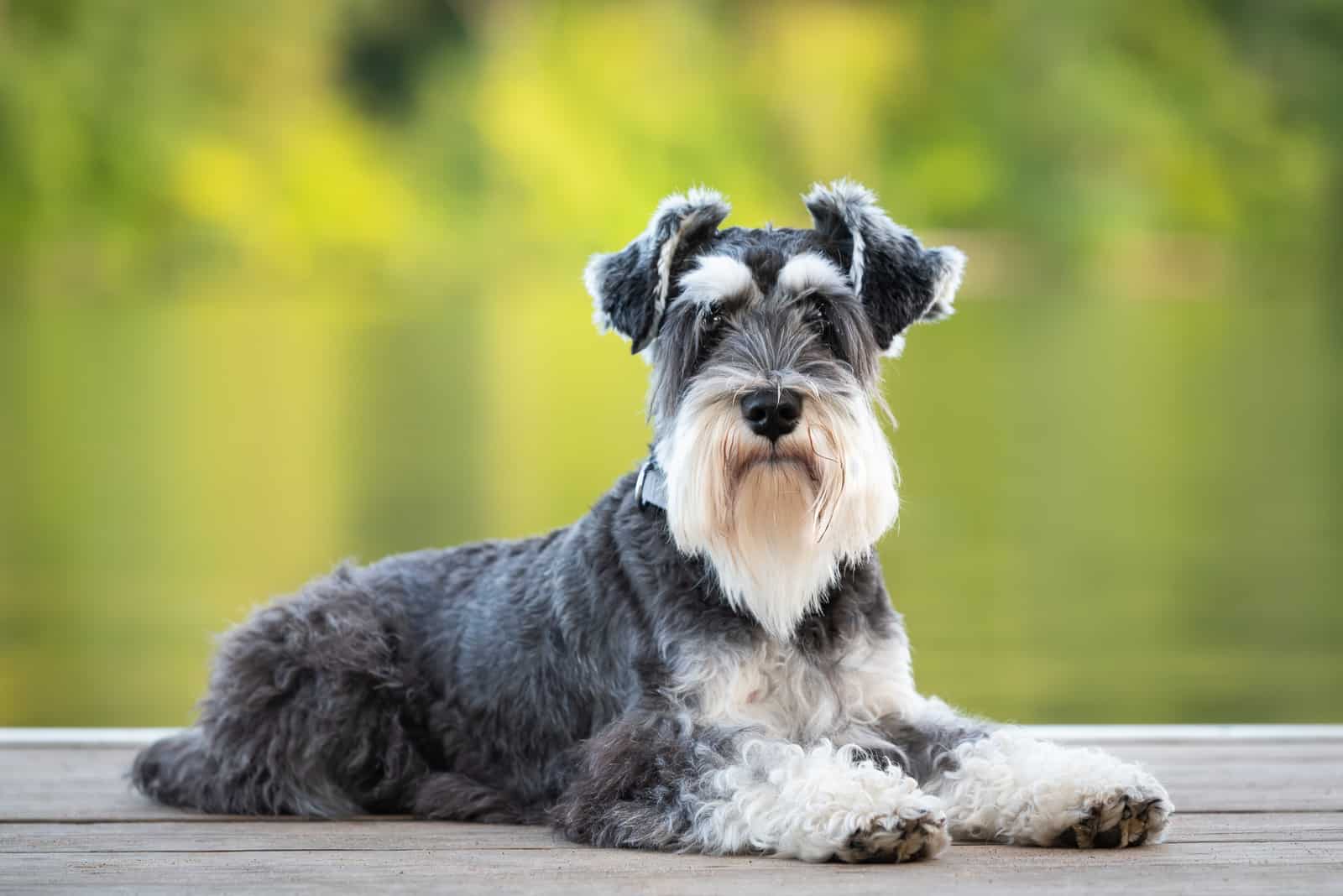
With so many dog food labels on the market, dog owners can easily choose the wrong kibble for their new Miniature Schnauzer dog. That said, it is important to stay away from bad dog food brands that will do more damage than good to the Mini Schnauzer’s health.
But, let’s talk about the good ones — dry dog food for Miniature Schnauzers is always a go-to and should be fed more often than wet food.
Dog food labels like Royal Canin and Purina are some of the best ones you will find for your Miniature Schnauzer puppy.
What I find really cool about these and similar dog food brands is that they make quality dog food that is designed especially for different dog breeds and for dogs that are suffering from certain health issues.
Pros And Cons Of Kibble
Dry dog food and puppy kibble are very convenient and easy to use when it comes to feeding the Mini Schnauzer. It is also very easy to store and it can last for months. But what I love about dog kibble is that it does not cause tartar kibble. Mini Schnauzers who eat kibble do not have tartar buildup on their teeth. Due to friction, kibble strips down tartar from Mini Schnauzer’s teeth.
For every Mini Schnauzer dog, kibble food manufacturers offer a variety of recipes (chicken, beef, salmon) designed specifically for different breed sizes (standard, toy, giant) and life stages.
There are more pros than cons to giving your Mini Schnauzer dog kibble — it can also be used in positive reinforcement training!
Perhaps there is a little downside to dry dog food — it can be very dehydrating for a Mini Schnauzer which is why owners must always provide them with a bowl of fresh water.
Pros And Cons Of Wet Food
Well the first thing that I want to mention is that wet dog food is a bit more tricky to store than dry food like kibble. It can also become spoiled very fast and it must be kept in the fridge. Quite a lot of work for a can of wet dog food for your Mini Schnauzer dog.
Additionally, giving your Mini Schnauzer only wet dog food will cost more because it is significantly more expensive than dry dog food.
The majority of the time, wet food has ingredients that are fresher, such as whole meat, which is an excellent source of protein for dogs. However, it can contain allergens and high fat content.
The biggest downside of feeding your Mini Schnauzer wet food is that it can lead to tartar forming on the dog’s teeth.
Miniature Schnauzer Feeding Chart: Important Food Ingredients
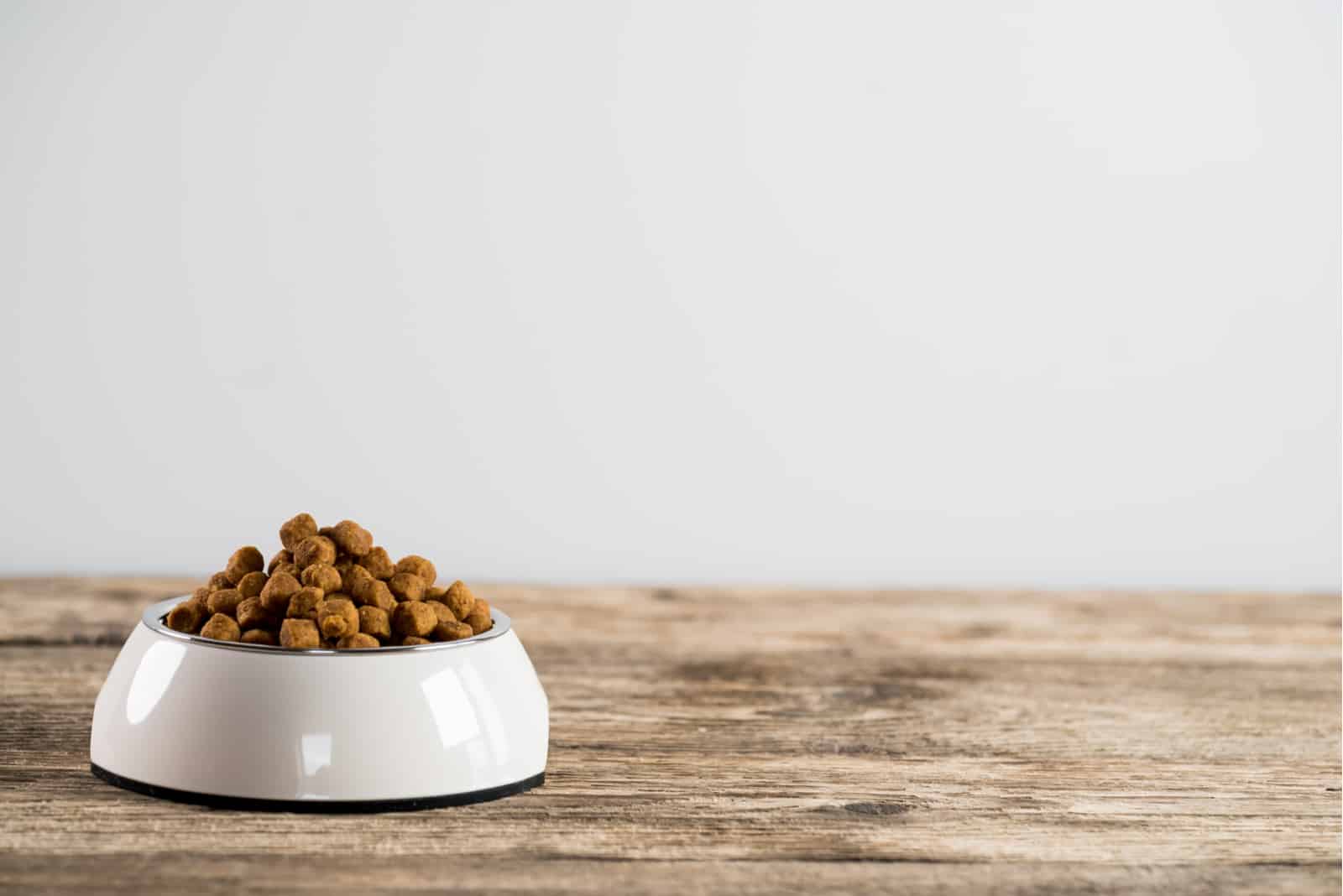
Every dog feeding chart should have a list of important dog food ingredients, right? No dog owner should be left guessing what kind of dog food ingredients they should look for when shopping for their Miniature Schnauzer’s food.
Aside from dog food that is free from GMOs, additives, by-products, sugars, and artificial colors, Miniature Schnauzer owners must pay attention to protein and fat content, as well as the amount of carbohydrates found in commercial dog food.
So, next time you head into the grocery store, check out the dog food labels and choose the best food ingredients for your Mini Schnauzer puppies.
Here are a few very important food ingredients that must be in both wet and dry dog food for the Miniature Schnauzer breed.
Protein
Attention all Miniature Schnauzer dog owners! The first ingredient on every dog food label that you have to pay attention to is PROTEIN! Yep, there is no natural Miniature Schnauzer growth without some good protein intake! Since our mini doggos are carnivores, they eat animal-based protein.
The most common animal protein sources in high-quality dog food for Miniature Schnauzers are fish, chicken, beef, pork, and turkey. Aside from that, oatmeals, legumes, and brown rice are also essential components of a protein-rich diet that breeders and owners feed their Mini Schnauzers.
You will immediately notice quality dog food when you look at the protein content. If you purchase dog food that is high in protein and incorporate it into its diet, your Miniature Schnauzer will gain healthy weight and healthy muscle mass.
Another very useful tip, especially for first-time dog owners is to keep an eye out for chicken by-product meals because they do not contain the real deal (real chicken meat).
Fatty Acids
Fatty acids are the single healthiest and most beneficial ingredient that is found in dog food for Miniature Schnauzers.
There is an omega-3 fatty acid component that deserves a lot of recognition which is why I want to specially talk about it. DHA aids in the proper and healthy development of your Miniature Schnauzer puppy’s healthy brain and eyes which automatically reduces the risk of health problems later in life. Psst, it may also be the reason why Miniature Schnauzers are among the smartest dog breeds!
In addition to keeping their brain and eyes healthy, omega-3 fatty acids are great for senior Miniature Schnauzers because they help treat canine arthritis and chronic kidney disease.
Now for the omega-6 fatty acids in Miniature Schnauzer’s diet — they are super important for normal growth, the establishment of a healthy and resilient immune system, as well as healthy-looking skin and coat. Along with omega-3, omega-6 fatty acids that are found in fish oils keep the Miniature Schnauzer’s coat color vibrant so it stands out among the crowd!
Feeding your Miniature Schnauzer dog food that has a high content of fatty acids such as omega-3 and omega-6 is essential for reducing shedding and keeping this dog’s hypoallergenic traits!
Minerals And Vitamins
Iron, calcium, magnesium, zinc, sodium, phosphorus, and other minerals help to maintain the Miniature Schnauzer’s excellent general health.
In order to grow strong and healthy, a Miniature Schnauzer dog needs to consume vitamins such as AD3E, vitamin B12, and vitamin C.
A single cup of food can contain all of these much-needed components to keep a Miniature Schnauzer as healthy as it can be.
However, for dog owners who prefer to feed their Miniature Schnauzer a more natural diet, keep in mind that it can lack some of these components. High-quality dog food for these pooches has an exact amount of minerals and vitamins that are perfectly balanced.
Food Supplements
Vitamin supplements are the most crucial for Mini Schnauzers, and not just any vitamin supplements, I’m talking multivitamins!
As the Miniature Schnauzer grows, its metabolism changes which is why it gradually loses its full capacity to effortlessly process food. So, these supplements usually jump in when Miniature Schnauzers are seniors.
However, some Mini Schnauzer puppies require supplements if they are growing up in a place without much Sunlight, or if they are born with a developmental handicap.
What Does It Mean To Feed A Miniature Schnauzer A Raw Food Diet?
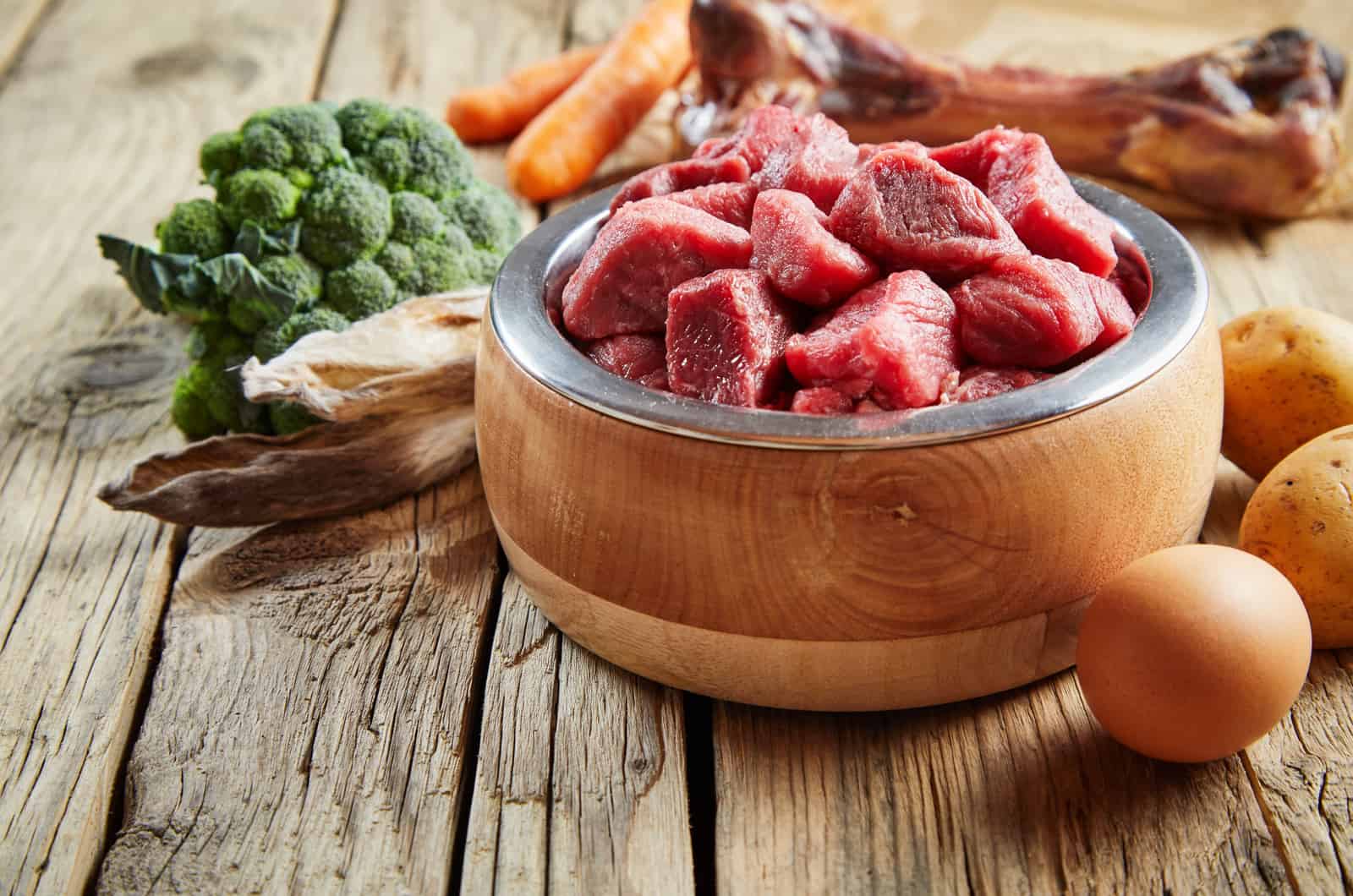
Let’s call it the BARF diet because that’s a better name for a raw food diet and you will see why! Note that you won’t see the name “BARF” anywhere in pet food stores. Why?
Because the BARF diet stands for Biologically Appropriate Raw Food and Bones and Raw Food, which means that it is a completely natural diet without any additives, by-products, fillers, and artificial colors.
What we mean by feeding a Miniature Schnauzer a raw food diet is giving it not only raw meat, but also raw fruit and veggies, as well as raw (not cooked) bones. Giving Mini Schnauzers proper amounts of raw food along with supplements is crucial to support their health throughout all stages of life.
That said, it is a no-brainer that the raw food diet is the healthiest diet to feed your Miniature Schnauzer.
Many paw lovers may argue that feeding your Miniature Schnauzer a raw food diet is dangerous and unhealthy. But, before we jump to any conclusions, let’s go back to when our domesticated fluffy pals were wild dogs.
Their ancestor, the wolf, still eats raw food and you rarely hear wolves having upset stomachs, right? Well, Miniature Schnauzers are descendants of wolves (even though they don’t look like them) which means that they are completely fine with eating raw foods.
What Can Mini Schnauzers Not Eat?
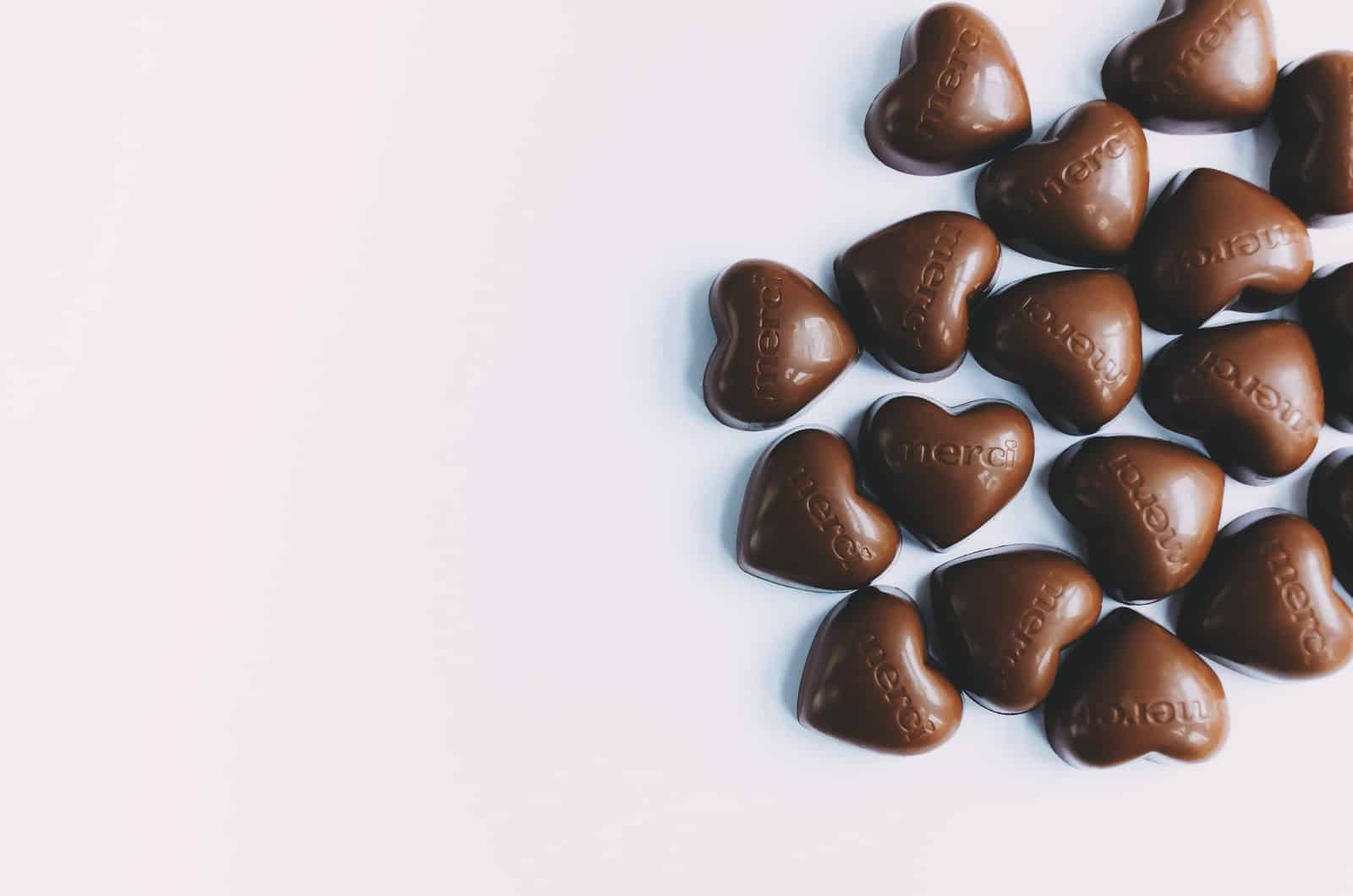
Miniature Schnauzers are, well, miniature! This means that they should not consume human food that is high in fat content. Human foods to avoid giving Miniature Schnauzers include:
- Fried food
- Chocolate
- Chips
- Tacos
- Bagels
- Cooked bones
- Fish sticks
- Macadamia nuts
- Processed food
As a responsible Miniature Schnauzer owner, you should never feed your puppy or adult human foods that will make their little stomach upset, or worse, lead to obesity or chronic illnesses.
What Human Food Can Miniature Schnauzers Eat?
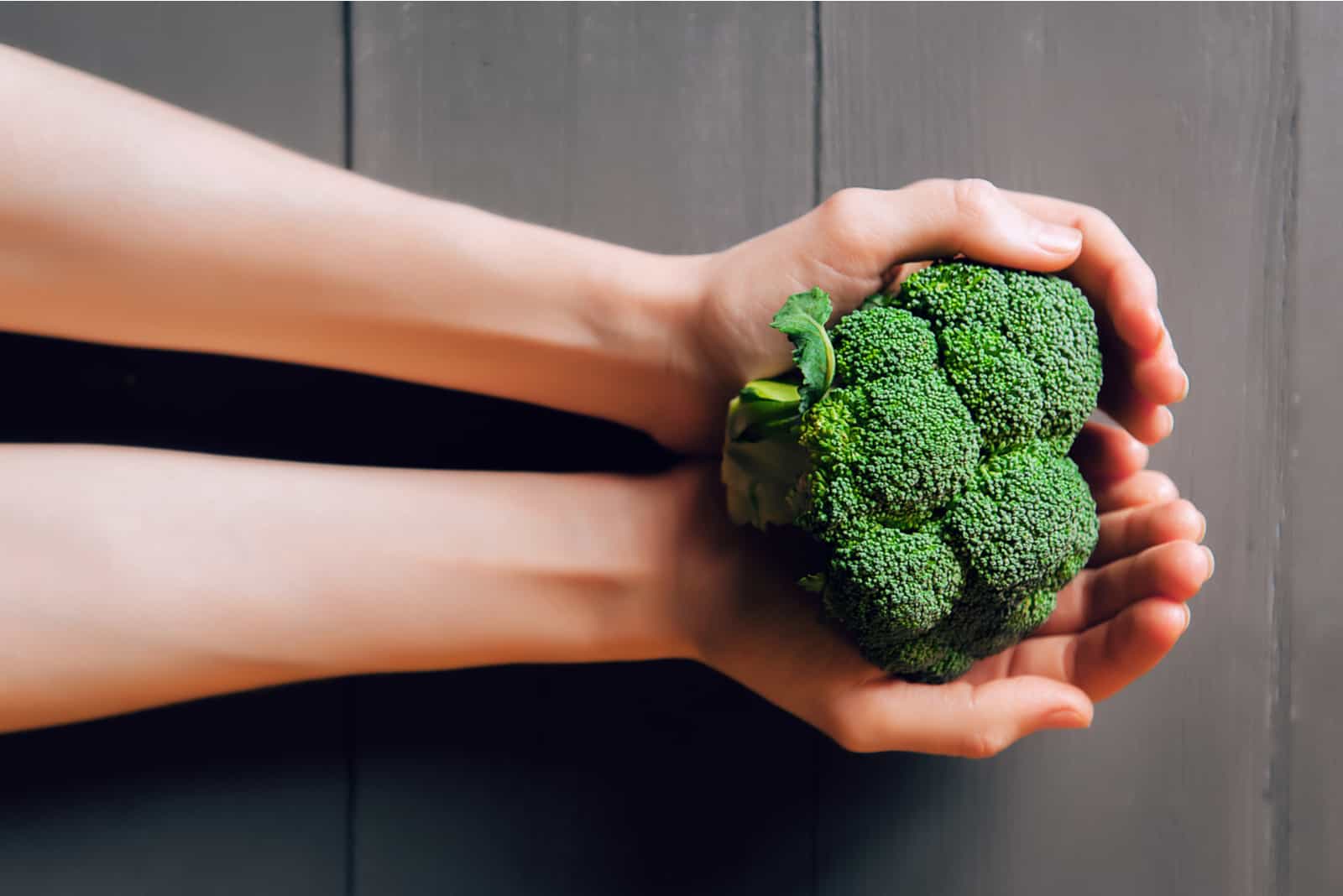
There are lots of tasty human foods that your Miniature Schnauzer can eat and that won’t cause any digestive problems. If you are having second thoughts about giving your dog whipped cream or sour cream, then we’re here to resolve that.
Among human foods, Miniature Schnauzers can safely eat:
- Meat: poultry, beef, pork
- Seafood: shrimp, tuna, salmon
- Veggies: broccoli, carrots, squash
- Eggs
A Miniature Schnauzer needs all the nutrients it can get and sometimes, plain dog kibble just isn’t enough.
Miniature Schnauzer Health Issues Due To Bad Diet
Improper feeding schedules and not following feeding guidelines for Miniature Schnauzers can lead to these puppies developing severe chronic health issues.
Sometimes, a sudden change in diet can lead to Miniature Schnauzer pooping clear liquid, which is usually not a big deal because it passes quickly. However, bad feeding habits that happen on a daily basis cause worse health issues for the Miniature Schnauzer.
Hyperlipidemia
Among all other dog breeds, Miniature Schnauzers are very prone to developing hyperlipidemia, a condition that is linked to bad feeding habits. So, what happens to Mini Schnauzer with hyperlipidemia?
Well, this term itself means a higher concentration of lipids (fat) in the Mini Schnauzer’s bloodstream. Generally, hyperlipidemia in dogs causes severe diarrhea and vomiting episodes, as well as seizures and stomach pain.
Pancreatitis
Pancreatitis may cause your Miniature Schnauzer to have a swollen stomach, but without showing signs of pain. Contrary to that, the most usual symptom of Pancreatitis in dogs is, in fact, abdominal pain.
Miniature Schnauzers that suffer from this health problem occasionally throw up yellow, as well as have severe diarrhea which can lead to dehydration.
Flaky skin is usually what follows this condition, along with lethargy and weakness.
Obesity
Canine obesity is common in all dog breeds, but it seems that our Miniature Schnauzer is especially prone to it. While it can be hereditary, obesity in Miniature Schnauzers can develop due to bad feeding habits.
No matter if they are puppies, adults, or seniors, Miniature Schnauzers are so cute that they bribe everyone with their adorable eyes.
However, this is not good because when worried dog owners bring their Mini Schnauzers for a weigh-in, they instantly become shocked at how much weight their puppy has gained.
How Many Dog Treats Are Acceptable?
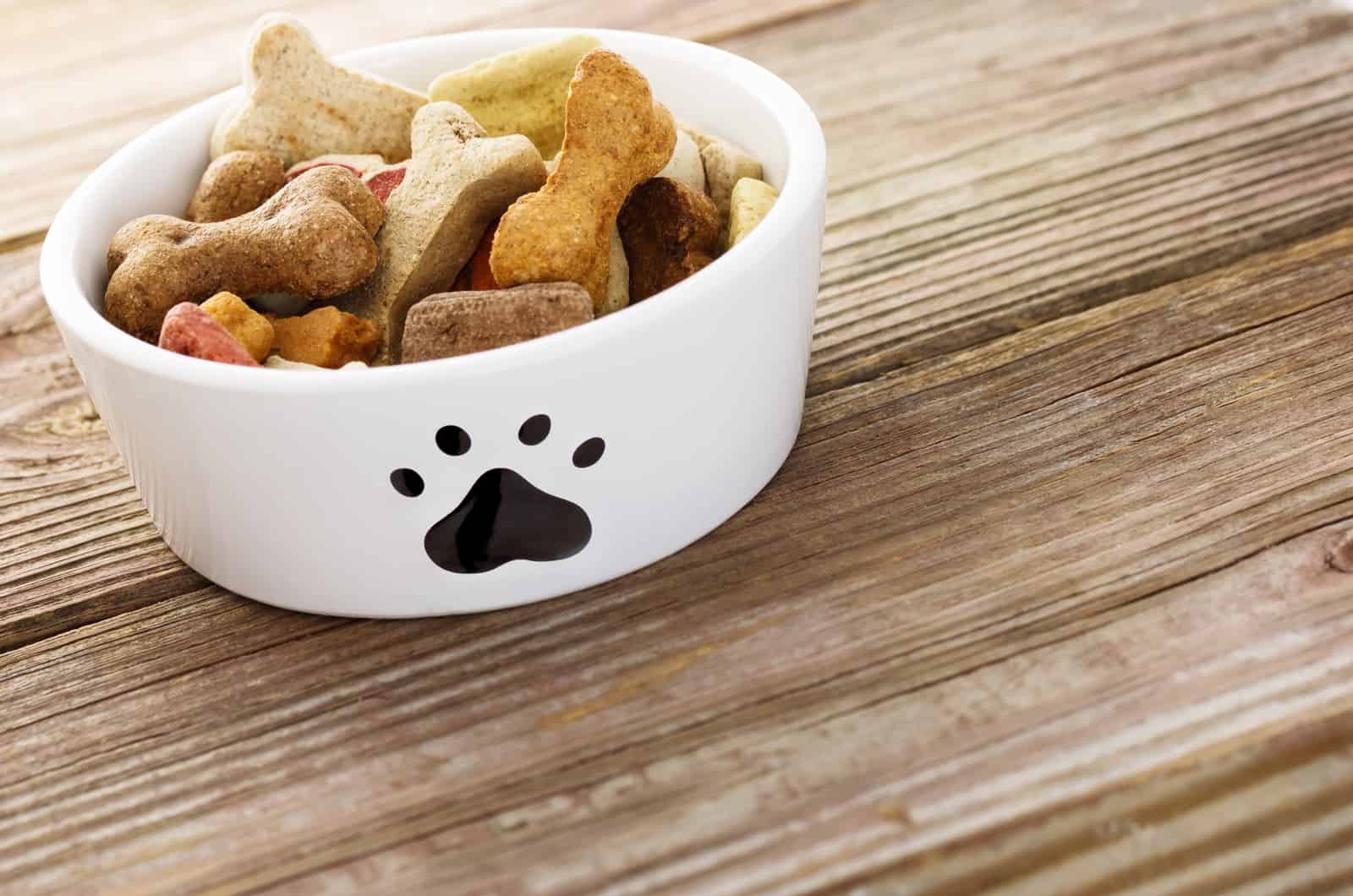
Trust me when I say that Miniature Schnauzers should not be given too many treats. They can become obese in a very short time and you don’t want to have to deal with putting your Mini Schnauzer or a diet and medication.
The recommended daily limit for treats to give to your Mini Schnauzer is two or three, depending on the calorie amount and fat content in each treat. Make sure to give your Mini Schnauzer treats as rewards whenever it is behaving well.
Don’t give your Mini Schnauzer treats just because it looks at you in a cute way, this is a recipe for disaster. If your Mini Schnauzer has an active daily schedule, a few more treats are completely acceptable.
Your Mini Schnauzer needs to have a good feeding schedule and a good balance between exercise and meal time.
Let’s Wrap It Up
Following the Mini Schnauzer feeding guidelines is pretty simple, but choosing the right dog food label may be a bit challenging because there are so many on the market!
This Miniature Schnauzer feeding chart advises new and aspiring owners about the amount of food, feeding schedule, and dog food ingredients to watch out for.
There are so many dog food ingredients that can cause various allergic reactions to small dogs such as Miniature Schnauzers, so it is always better to be safe than sorry.
So, if you find yourself walking in circles and thinking about what to feed your new Terrier puppy, make sure to stop by and find answers in this Miniature Schnauzer feeding chart.
In case you have any questions, do not hesitate to contact your veterinarian who will surely provide you with a lot of information on feeding the Miniature Schnauzer. You can also ask a veterinary nutritionist if you can find one!
Related Content
Ultimate Newfoundland Feeding Chart + Food Choices & Tips
